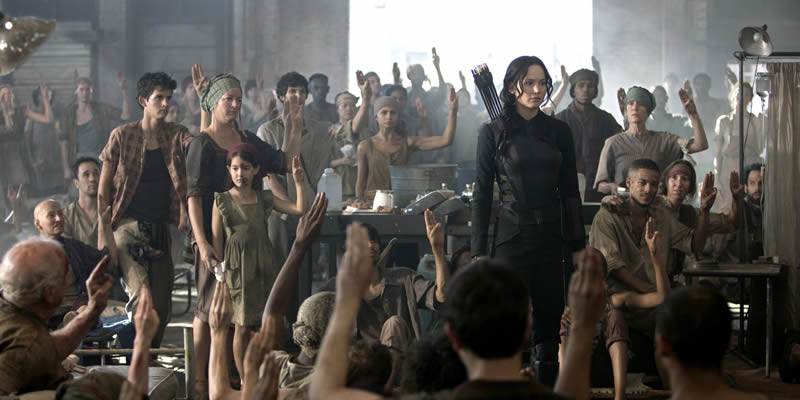After seeing The Hunger Games: Mockingjay – Part I, I have not stopped thinking about the movie, mulling over the events and concepts, the sure sign of a good movie. Unlike the book purists out there, I have not read the series and I do not care how closely the movies stick to the book nor how much the filmmakers trying to “milk it.”
This was a damn good movie, plain and simple. In fact, it is the best of the series so far. Even better, there is plenty of fodder for historians to utilize.
I have heard the criticisms that this movie is slower than the first two and this is supposedly a result of breaking the third book up into two movies. I assume they all want Katniss Everdeen to take command and lead a ragtag group of freedom fighters to victory.
Instead, Mockingjay gives us a girl going through PTSD who cares more about her teenage crushes than world revolution. In addition, we get a seemingly well-equipped band of insurgents who are still too timid to go head on against the world’s remaining superpower after hiding for 75 years. As an alternative, they are blowing their budget on propaganda videos, terrorist attacks, and commando raids.
You know, realism.
For historians, this movie is a goldmine. How often have we had to explain the basic concepts of propaganda and how they permeate history and even today’s society? Instead, Mockingjay does all the work for us. Here, even the “good guys” are doing all they can to create a political message that discredits their enemy. In the process, they learn that you cannot manufacture good propaganda; it needs to come from the heart, something seemingly out of a Joseph Goebbels memoir. The fumbling takes and re-takes, the composing of an inspirational folk song for the people, and the directors who join the rebellion merely to make quality films all bring a realism to Mockingjay that few war movies feature.
For military historians, the strategies of both sides present a superb discussion about Clausewitz’s “center of gravity” theory that has overshadowed military thought for decades. The theory focuses on how each opponent’s strength will differ and until you destroy that center of gravity, that opponent is not beaten. For example, Japan’s center of gravity in World War II was its emperor. Until he surrendered, Japan continued to fight. For Confederacy during the Civil War, it was the Army of Northern Virginia. For Athens in the Peloponnesian War, it was the city. Each war is different.
In Mockingjay, this theory explains how a rebellion meant to liberate the people willingly remained idle while multiple districts were destroyed. The answer comes during the Capitol’s direct assault on District 13, when the rebellion realizes any counterattack serves only to give the Capitol intelligence on where to attack. Quite simply, District 13 is the rebellion’s center of gravity, not the lives of other districts. This is a hard lesson.
President Snow’s notion of “moves and countermoves” shows that he understands there is more to war than scoring casualties, as he cares more about discrediting the symbol of the Mockingjay and more importantly, demoralizing the rebellion’s chosen leader than about scoring casualties. He, perhaps mistakenly, sees Everdeen as the center of gravity.
These are important concepts many generals and most political leaders have struggled to learn, but teenagers watching this film will instantly grasp them.
Mockingjay – Part I has an Empire Strikes Back feel to it, only gloomier. It is clearly a middle child and the antagonists have a lot of work to recover from their setbacks. Like Vader and Skywalker, there is a duel between Snow and Everdeen. The difference is that instead of brute force, Snow gains the upper hand psychologically. Peeta is our Han Solo on carbon ice, but there appears to be little hope of bringing Peeta back. It is cruel, sadistic, and fascinating.
For those who thought this movie had too little action forget that the theme of the whole series is propaganda and controlling the people. Such concepts do not always involve games.

